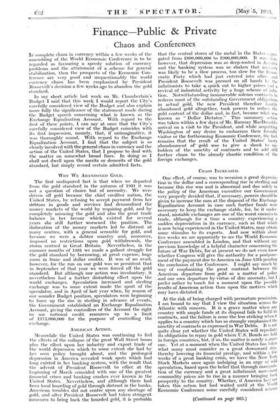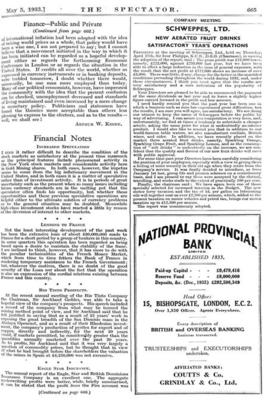Finance—Public & Private
Chaos and Conferences
IF complete chaos in currency within a few weeks of the assembling of the World Economic Conference is to be regarded as favouring a speedy solution of currency problems and the attainment of scheme for general stabilization, then the prospects of the Economic Con- ference are very good and unquestionably the world currency chaos has been emphasized by President Roosevelt's decision a few weeks ago to abandon the gold standard.
In my short article last week on Mr. Chamberlain's Budget I said that this week I would report the City's carefully considered view of the Budget and also explain more-fully the significance of the statement made during the Budget speech concerning what is known as the Exchange Equalization Account. With regard to the first of these points, I can say at once that the City's carefully considered view of the Budget coincides with its first impression, namely, that, if unimaginative, it was thoroughly sound. With regard to the Exchange Equalization Account, I find that the subject is so closely involved with the-general chaos in currency and the action of the United States, that I propose to deal with the -matter on somewhat broad lines. In doing so I shall not dwell upon the merits or demerits of the gold standard, but simply record certain admitted facts.
WHY WE ABANDONED GOLD.
• The first undisputed fact is that when we departed from the gold standard in the autumn of 1931 it was not a question of 'choke but of necessity. We were driven off gold because the chief creditor nation, the United States, by refusing to accept payment from her debtors in goods and services had demoralized the money markets of the world by requiring gold, and_ by completely misusing the gold and also the great trade balance in her favour which existed for several years she still further worsened the position. The dislocation of the money markets led to distrust at many centres, with a general scramble for gold, and because we were a debtor country and, moreover, imposed no restrictions upon gold withdrawals, the storm centred- in Great Britain. Nevertheless, in the summer months of 1931 we made a gallant struggle for the gold standard by borrowing, at great expense, huge sums in franc and dollar credits. It was of no avail, however, for the run on our gold was so persistent that in September of that year we were forced off the gold standard. But although our action was involuntary, it nevertheless had a further disturbing effect upon the world exchanges. Speculation increased and sterling exchange was to some extent made the sport of the speculator, and in April of last year when, by reason of our sounder Budget position, speculators were beginning to force up the rise in sterling in advance of events, the Government established an Exchange Equalization Account, giving the controllers of the Account the right to use national credit resources up to a limit, of £175,000,000 for the purpose of controlling the exchange.
AMERICAN ACTION.
Meanwhile the United States was continuing to feel the effects of the collapse of the great Wall Street boom plus the effect upon her industry and. export trade of the world depression which to some extent she had by her own policy brought about, and - the prolonged depression in America revealed weak spots which had long existed in her banking system, with the result that the advent of President Roosevelt to office at • the beginning of March coincided with one of the greatest financial crises and banking crashes ever known in the United States. Nevertheless, and although there had been local hoarding of gold through distrust in the banks, -American troubles did not centre upon any shortage of gold, and after President Roosevelt had taken stringent 'measures to bring back the hoarded gold, it is probable that the central stores of the metal in the States fyggre- gated from £800,000,000 to £900,000,000. It was.1- car, however, that depression was so deep-rooted in America and the banking system was so shaken that recovery was likely to be a slow process, -too slow for the Demo- cratic Party . which had just entered into office, and President Roosevelt was pressed on all hands by the inflationists to take k.quick cut to higher prices and a revival of industrial activity by a huge scheme of infla- tion. Notwithstanding innumerable solemn contracts to redeem most of the outstanding .Government obligations in actual gold, the new President therefore hastily abandoned gold altogether, took powers to reduce the gold content of the dollar and, in fact, became what was known as " Dollar Dictator." This summary action was taken within a few days of Mr. Ramsay MacDonald's arrival on a visit to the President, and 'while acquitting Washington of any desire to embarrass their friendly visitor or the forthcoming Economic Conference, the fact remains that the result of the United States' hasty abandonment of'gold- was- to give a - shock to up- holders of the sanctity of contracts and to add still further chaos to the already chaotic condition of the foreign exchanges.
CHAOS INCREASED.
•
One effect, of course; was to occasion a great deprecia- tion in the dollar and a corresponding-rise in sterling, and because this rise 'was and is abnormal and due solely to the policy of the American executive our Government very properly decided that, if necessary, powers should be given to increase the sum at the disposal of the Exchange Equalization Account in case such further funds were necessary to keep the exchange stable, for, be it under- stood, unstable exchanges are one of-the worst enemies to trade, although for a time a country experiencing a sudden depreciation in its currency, such as that which is now being experienced in the United States; may obtain some stimulus to its exports. And now within about five weeks we are apparently to see the World Economic Conference assembled in London, and that without any previous knowledge of a helpful Character concerning the future of War Debts, Tor at present we do not even know whether Congress will give the authority for a postpone- ment of the payment due to America on June 15th pending the conclusion of the Conference. I might say much by way of emphasizing the great contrast between the American departure from gold as a matter of policy and our own departure by virtue of dire necessity, but I prefer rather to touch for a moment upon 'the possible results of American action than upon the motives which may have dictated it.
At the risk of being charged with premature pessimism, I am bound to say that I view the situation across the Atlantic with concern. It is a grave matter when any country with ample.funds at its disposal fails to fulfil its contracts, and the failure is none the less- striking when it applies to a country which has so strongly emphasized the sanctity of contracts as expressed in War Debts. It is not quite clear yet whether the United States will repudiate its obligations to repay in gold where U.S. Bonds are held in foreign countries, but, if so, the matter is surely a grave one. Yet at a moment when the United States has taken what many must consider as a great downward step, thereby lowering its financial prestige, and within a few weeks of a great banking' crisis, we have the New York Stock Markets once again indulging in an orgy of wild speculation, based upon the belief that through manipula- tion of the currency and a great inflationist movement commodity prices are to rise in a manner bringing back prosperity to the country. Whether, if America had not taken this action but had waited until at the World Economic Conference some carefully considered scheme I (Continued on page 665.)
Finance—Public and Private
(Continued from page 662.) of international inflation had been adopted with the idea of raising world prices as a whole, that policy would have been a wise one, I am not prepared to say; but I cannot believe that a movement initiated in the way in which it has been initiated can be regarded as a hopeful develop- ment either as regards the forthcoming Economic Conference in London or as regards the situation in the United States. If credits all over the world, whether as expressed in currency instruments or in banking deposits, were trebled tomorrow, I doubt whether there would, necessarily, be one man more employed than today. Many of our political economists, however, have impressed the community with the idea that the present confusion can be checked, unemployment decreased and standards of living maintained and even increased by a mere change in monetary policy. Politicians and statesmen have found the theories more acceptable than others less pleasing to express to the electors, and as to the results— well, we shall see I ARTHUR W. KIDDY,











































 Previous page
Previous page